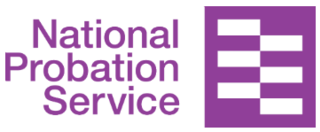Measure 11, also known as "One Strike You're Out", was a citizens' initiative passed in 1994 in the U.S. State of Oregon. This statutory enactment established mandatory minimum sentencing for several crimes. The measure was approved in the November 8, 1994 general election with 788,695 votes in favor, and 412,816 votes against.
A pardon is a government decision to allow a person to be relieved of some or all of the legal consequences resulting from a criminal conviction. A pardon may be granted before or after conviction for the crime, depending on the laws of the jurisdiction.

Parole is the early release of a prisoner who agrees to abide by certain conditions, originating from the French word parole. The term became associated during the Middle Ages with the release of prisoners who gave their word.

The International Military Tribunal for the Far East (IMTFE), also known as the Tokyo Trial or the Tokyo War Crimes Tribunal, was a military trial convened on April 29, 1946, to try the leaders of the Empire of Japan for joint conspiracy to start and wage war, conventional war crimes and crimes against humanity.

The National Probation Service for England and Wales is a statutory criminal justice service, mainly responsible for the supervision of offenders in the community and the provision of reports to the criminal courts to assist them in their sentencing duties. It was established in its current form by the Criminal Justice and Court Services Act in April 2001, but has existed since 1907 as a set of area-based services interacting at arm's length with central government.

In France, career judges are considered civil servants exercising one of the sovereign powers of the state, so French citizens are eligible for judgeship, but not citizens of the other EU countries. France's independent court system enjoys special statutory protection from the executive branch. Procedures for the appointment, promotion, and removal of judges vary depending on whether it is for the ordinary or administrative stream. Judicial appointments in the judicial stream must be approved by a special panel, the High Council of the Judiciary. Once appointed, career judges serve for life and cannot be removed without specific disciplinary proceedings conducted before the Council with due process.

The courts of Scotland are responsible for administration of justice in Scotland, under statutory, common law and equitable provisions within Scots law. The courts are presided over by the judiciary of Scotland, who are the various judicial office holders responsible for issuing judgments, ensuring fair trials, and deciding on sentencing. The Court of Session is the supreme civil court of Scotland, subject to appeals to the Supreme Court of the United Kingdom, and the High Court of Justiciary is the supreme criminal court, which is only subject to the authority of the Supreme Court of the United Kingdom on devolution issues and human rights compatibility issues.
In England and Wales, life imprisonment is a sentence that lasts until the death of the prisoner, although in most cases the prisoner will be eligible for parole after a fixed period set by the judge. This period is known as the "minimum term", usually a few years. In some exceptionally grave cases, however, a judge may order that a life sentence should mean life by making a "whole life order."

The Cabinet Secretary for Justice, commonly referred to as the Justice Secretary, is a position in the Scottish Government Cabinet. The Cabinet Secretary has overall responsibility for law and order in Scotland. The Cabinet Secretary is assisted by the Minister for Community Safety and Legal Affairs.
The Parole Board of Canada is the Canadian government agency that is responsible for reviewing and issuing parole and criminal pardons in Canada. It operates under the auspices of Public Safety Canada.
The "faint hope clause" is the popular name for s.745.6 of the Canadian Criminal Code, a statutory provision that allows prisoners who have been sentenced to life imprisonment with a parole eligibility period of greater than 15 years to apply for early parole once they have served 15 years. Offenders who committed their offence after December 2, 2011 are no longer eligible to apply for the faint hope clause. However, those convicted of offences that occurred prior to that date may still be eligible.

The Parole Board for England and Wales was established in 1968 under the Criminal Justice Act 1967. It became an independent executive non-departmental public body (NDPB) on 1 July 1996 under the Criminal Justice and Public Order Act 1994. The Parole Board is governed by the Parole Board Rules 2016 made by Parliament under the Criminal Justice Act 2003. Parole Board members are appointed by the Secretary of State for Justice, but are required to take judicial decisions independent of Government. The Parole Board's role is to make risk assessments about prisoners and to make a binding direction to Government about whether prisoners are released into the community on parole. The Parole Board must also give advice to Government when asked, most often about whether offenders are ready to be moved to open prisons from the closed prison estate.

The New York State Division of Parole is an agency of the government of New York within the New York State Correctional Services § 259. "1. There shall be in the executive department of state government a state division of parole" responsible for parole, the supervised release of a prisoner before the completion of his/her sentence.
Crime in New Zealand encompasses criminal law, crime statistics, the nature and characteristics of crime, sentencing, punishment, and public perceptions of crime. New Zealand criminal law has its origins in English criminal law, which was codified into statute by the New Zealand parliament in 1893. Although New Zealand remains a common law jurisdiction, all criminal offences and their penalties are codified in New Zealand statutes.
Compassionate release is a process by which inmates in criminal justice systems may be eligible for immediate early release on grounds of "particularly extraordinary or compelling circumstances which could not reasonably have been foreseen by the court at the time of sentencing". Compassionate release procedures, which are also known as medical release, medical parole, medical furlough and humanitarian parole, can be mandated by the courts or by internal corrections authorities. Unlike parole, compassionate release is not based on a prisoner's behavior or sentencing, but on medical or humanitarian changes in the prisoner's situation.
An Order for Lifelong Restriction is a sentence that can be imposed by a judge of the High Court of Justiciary on serious violent and sexual offenders in Scotland. Such an Order is an indeterminate sentence will see the convict subject to indefinite imprisonment and supervision by electronic monitoring for the rest of their lives. An offender will only be released on licence where it is determined that the risks posed to the community can be correctly and safely managed.
The New Zealand Parole Board is an independent statutory body established in 2002 that considers offenders for parole. Its task "is to undertake an assessment of the risk that long-term sentenced offenders might pose to the safety of the community if they were to be released before the end of their sentence". The Board also sets conditions of release for offenders so their reintegration back in to the community can be effectively managed. Once the conditions are set it becomes the responsibility of Community Corrections to manage the offender." 'Long term' is defined as more than 24 months. Short-term prisoners are automatically released after serving half their sentence.
The New Zealand Probation Service is a branch or service of the New Zealand Corrections Department. Established in 1886, its role is to manage offenders sentenced to community based sentences such as home detention, community detention and intensive supervision. The Service also manages prisoners in the community who have been released on parole and offenders on release conditions at the end of their prison sentence. According to Corrections website, in 2014 the Service was looking after approximately 30,000 offenders in the community. The Probation Officer's role is described as "work(ing) with people on probation to motivate them to make changes in their lives. This may include attending programmes to address violence, alcohol and drug abuse or driving offences."

The Scottish Sentencing Council is an advisory non-departmental public body in Scotland that produces sentencing guidelines for use in the High Court of Justiciary, sheriff courts and justice of the peace courts. Judges, sheriffs, and justices of the peace must use the guidelines to inform the sentence they pronounce against a convict, and they must give reasons for not following the guidelines.
Joseph McCann is an English-born Scottish–Irish traveller and serial rapist. In April and May 2019, McCann committed sexual attacks in Hertfordshire, London, Greater Manchester and Cheshire against 11 strangers, ranging in age from an 11-year-old boy to a 71-year-old woman. He evaded police, who suspect that he was sheltered by a "support network" across the country. For these crimes, he was tried at the Old Bailey and, on 6 December, convicted of 37 offences. Three days later, he was given 33 life sentences.












